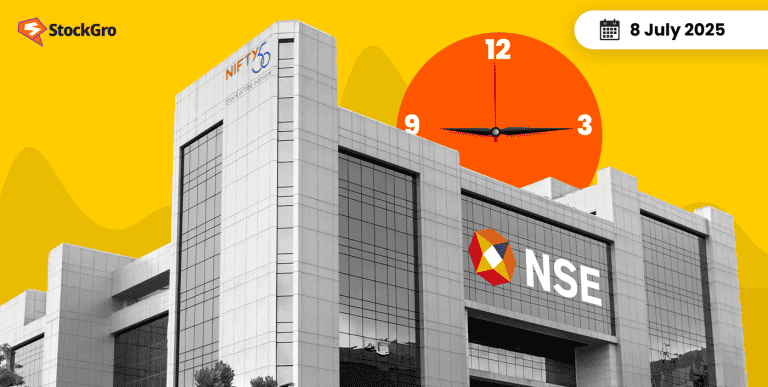
On July 8, 2025, shares of BSE Ltd, Asia’s oldest stock exchange, tumbled by over 7%. This marked the latest blow in a series of declines, exacerbated by regulatory concerns surrounding SEBI’s crackdown on propriety trading firm Jane Street. However, an even more pressing issue is SEBI’s potential move to curb leverage in options trading.
The fear is real. Investors are anxious about the long-term effects of SEBI’s proposed rule, which would link options exposure to actual cash holdings. If the proposal is implemented, it would significantly alter the options trading landscape by limiting the leverage traders can use. While this would help protect retail investors, who often face heavy losses from leveraged positions, it could also reduce trading volumes, affecting companies like BSE that thrive on high-volume derivatives trading.
Also read: PC Jeweller Share Price Jumps 17% After Strong Q1 FY26 Results
Why did the BSE share price fall?
BSE share price has already taken a 10% hit since SEBI launched its investigation into Jane Street. The crackdown on the US-based trading firm has created a ripple effect in the broader market, and the new leverage proposals are only deepening investor concerns. These new regulations are expected to reduce the liquidity in the options market, ultimately affecting the profits of exchanges like BSE, as they earn substantial revenue from derivatives trading.
What’s going on with other Exchange-related stocks?
BSE’s tumble is not an isolated event. Other capital market stocks, including MCX (Multi Commodity Exchange) and Angel One, also saw declines ranging from 3% to 7% on July 8. This sharp drop comes as reports emerged about SEBI’s discussions to link traders’ options exposure to their cash positions. This could significantly impact retail traders who use high leverage in the options market, as they would no longer be able to take large positions without owning an equivalent amount of stocks.
For market intermediaries, these changes could be a serious concern. MCX, BSE, and Angel One all depend heavily on high trading volumes in derivatives to generate their revenue. If the volume of speculative options trades drops, the short-term revenue of these firms could face pressure.
You may also read: Angel One stock analysis & expert insights in detail
Why does SEBI want to limit options leverage?
SEBI’s main concern is to curb excessive speculation, particularly in the options market, where retail traders have been taking on massive leveraged positions with minimal capital. The options market has exploded in India in recent years, and while it’s generated significant revenue for exchanges and brokers, the regulator is concerned about the growing number of retail investors losing money. Over 90% of retail traders are reportedly making losses due to high leverage and speculative trading, which is why SEBI is keen on introducing these new measures.
SEBI aims to:
- Protect retail investors from excessive losses.
- Reduce speculative and unhedged (“naked”) positions in the market.
- Boost liquidity in the cash (stock) market, shifting focus from options trading to a more stable trading environment.
How will this affect brokers and exchanges?
As of now, BSE, Angel One, and MCX are highly dependent on trading volumes in options and derivatives. If SEBI’s proposed changes come into effect, brokers and exchanges could see a decline in revenue from brokerage fees, transaction fees, and other charges related to options trading.
The fear of declining revenues is why these stocks have taken a hit. As reported, BSE shares fell by 5-7% on July 8. Angel One also saw a significant dip of around 6%, while MCX lost about 3-4%.
What’s next for BSE and exchange-related stocks?
While the proposal is still under discussion, the prospect of these changes has already affected investor sentiment. If SEBI pushes forward with its plans, the market landscape could change drastically. Exchanges and brokers will need to shift their focus from speculative trading products to more stable, long-term investments to maintain their revenue streams.
For BSE and other market firms, this could mean a more diversified business model, potentially focusing on increasing liquidity in the cash market and reducing reliance on high-leverage products. The shift could also lead to changes in how brokers interact with retail investors, encouraging them to take a more balanced approach to trading.
You may also like: Trent Shares Crash 11%: Radhakishan Damani Takes Rs 310 Cr Hit as Tata Stock Slumps
Final Thoughts: Will the options market survive these changes?
In summary, the regulatory storm in the Indian capital markets is here. While SEBI’s move aims to curb speculative trading and protect retail investors, the immediate impacts are being felt by BSE and other firms dependent on options market revenue. The future of these exchanges might shift towards more stable revenue sources, and the speculative trading model could see a decline. Investors should keep an eye on the developments and prepare for potential volatility in the market.

